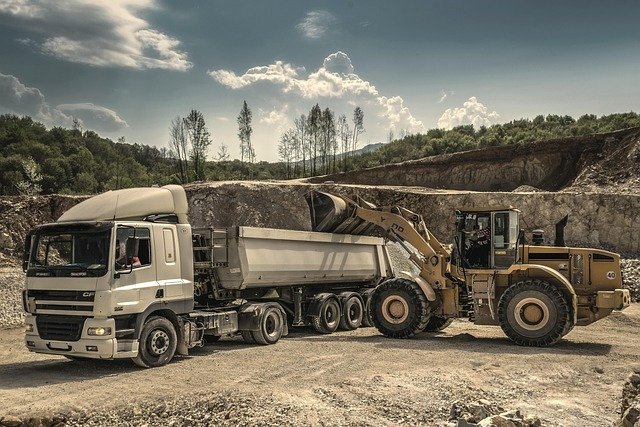Excavator Operator Opportunities in the USA: Roles, Requirements, and Career Growth
Excavator operator positions in the USA offer competitive pay with both full-time and part-time options. Whether you have experience or not, the industry provides great opportunities for career growth, including paid internships. Learn more about the prospects in the article.

What does an excavator operator do?
Excavator operators are skilled professionals who operate heavy machinery to move earth, rocks, and other materials on construction sites, mines, and landscaping projects. Their primary responsibilities include:
- Controlling and maneuvering excavators to dig trenches, foundations, and tunnels
- Grading and leveling terrain
- Loading and unloading materials onto trucks or conveyors
- Performing basic maintenance on excavators
- Adhering to safety protocols and regulations
These professionals play a crucial role in various industries, including construction, mining, and infrastructure development.
What are the requirements to become an excavator operator?
While entry-level positions often don’t require extensive experience, there are several requirements and qualifications that aspiring excavator operators should consider:
- High school diploma or equivalent
- Valid driver’s license
- Completion of a vocational program or apprenticeship (recommended)
- Certification from organizations like the National Commission for the Certification of Crane Operators (NCCCO)
- Physical fitness and ability to work in various weather conditions
- Strong hand-eye coordination and depth perception
- Attention to detail and safety consciousness
Many employers provide on-the-job training for entry-level positions, making it possible for individuals with no prior experience to enter the field.
What types of excavator operator jobs are available?
The excavator operator industry offers a variety of job opportunities to suit different preferences and skill levels:
- Full-time positions: Many construction companies and mining operations offer stable, full-time roles for excavator operators.
- Part-time and seasonal work: Some projects may require operators on a part-time or seasonal basis, providing flexibility for those seeking variable schedules.
- Freelance or contract work: Experienced operators can work as independent contractors for multiple clients or companies.
- Specialized roles: Some operators focus on specific types of projects, such as underwater excavation or demolition work.
- Apprenticeships and internships: These opportunities allow newcomers to gain hands-on experience and learn from seasoned professionals.
The diversity of available positions makes it easier for individuals to find roles that align with their career goals and lifestyle preferences.
How much do excavator operators earn?
Excavator operators in the United States can expect competitive salaries, with earnings varying based on factors such as experience, location, and industry. While specific figures can fluctuate, here’s a general overview of salary ranges:
- Entry-level operators: $30,000 - $45,000 per year
- Mid-level operators: $45,000 - $65,000 per year
- Experienced operators: $65,000 - $90,000+ per year
Some operators may also receive additional benefits such as health insurance, retirement plans, and paid time off. It’s worth noting that overtime work is common in this field, which can significantly increase overall earnings.
What are the career growth opportunities for excavator operators?
The excavator operator field offers numerous opportunities for career advancement and professional growth:
- Specialization: Operators can focus on specific types of excavation work, such as underwater or high-rise construction.
- Supervisory roles: Experienced operators can advance to positions like foreman or site supervisor.
- Training and instruction: Some operators become trainers or instructors for new entrants to the field.
- Equipment sales: Knowledge of excavators can lead to careers in equipment sales or rental.
- Business ownership: Experienced operators may start their own excavation or construction businesses.
Continuous learning and staying updated with the latest technologies and safety practices can help operators advance their careers and increase their earning potential.
How can one get started in the excavator operator industry?
For those interested in pursuing a career as an excavator operator, here are some steps to get started:
- Research the field and understand the job requirements
- Obtain a high school diploma or equivalent
- Consider enrolling in a vocational program or apprenticeship
- Gain experience through entry-level positions or internships
- Obtain necessary certifications (e.g., NCCCO)
- Network with industry professionals and join relevant associations
- Stay updated on industry trends and new technologies
By following these steps and demonstrating dedication to safety and skill development, aspiring excavator operators can position themselves for success in this growing industry.
The excavator operator industry in the United States offers a promising career path with numerous opportunities for growth and advancement. Whether you’re seeking full-time employment or prefer the flexibility of part-time or contract work, this field provides options to suit various career goals. With competitive salaries, the potential for specialization, and the ability to enter the industry without prior experience, becoming an excavator operator can be an attractive choice for those interested in operating heavy machinery and contributing to important construction and infrastructure projects.
The shared information of this article is up-to-date as of the publishing date. For more up-to-date information, please conduct your own research.




